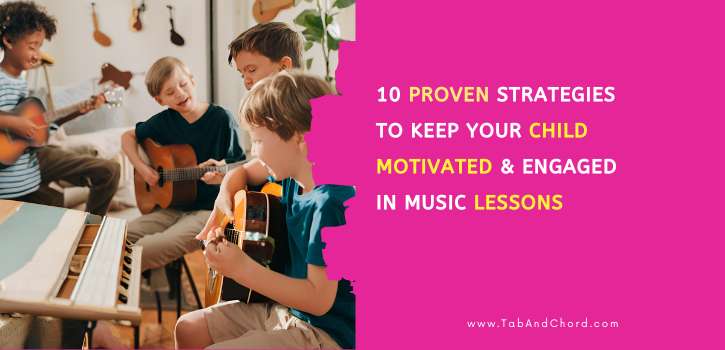10 Proven Strategies to Keep Your Child Motivated and Engaged in Music Lessons
Engaging a child in music lessons is a wonderful way to foster creativity, discipline, and a lifelong appreciation for the arts. However, keeping them motivated and enthusiastic about their practice can sometimes be challenging. Whether they’re learning to play the guitar, ukulele, or any other instrument, the key to their success lies in creating an environment that nurtures their interest and encourages them to stick with it. In this guide, we’ll explore 10 proven strategies designed to inspire your child to stay committed to their music lessons, turning what could be a fleeting hobby into a lasting passion.
Certainly! Here’s a more detailed explanation of each point:
1. Make It Fun and Engaging
- Choose the Right Instrument: Children are more likely to stick with an instrument if they are excited about it. Let them experiment with different instruments until they find one that truly captures their interest. If they like the guitar or ukulele, for example, encourage that choice because their enthusiasm will drive their commitment.
- Incorporate Their Favorite Music: Learning to play songs they already love can make practice feel less like work and more like play. If your child loves a particular band or movie soundtrack, find simplified versions of those songs to teach them. This way, they see a direct connection between their lessons and the music they enjoy.
- Interactive Learning: Use games and apps designed to make learning music more interactive. These tools often turn lessons into a game, where progress is rewarded, and challenges are fun to overcome. For example, apps like Yousician or Simply Guitar can make practice sessions more engaging.
2. Set Achievable Goals
- Short-Term Goals: Setting small, attainable goals helps keep children motivated. These could include learning a new chord, mastering a simple song, or improving finger strength with a new exercise. Celebrate these milestones to build their confidence and sense of accomplishment.
- Long-Term Goals: Having a bigger goal can provide a sense of purpose. This could be preparing for a recital, recording a song, or learning a favorite song to play for friends. The sense of achievement from reaching a long-term goal can inspire continued effort.
3. Create a Supportive Environment
- Positive Reinforcement: Children thrive on encouragement. Praise their effort, even when the results aren’t perfect. This positive reinforcement helps them associate music practice with positive feelings, which is crucial for long-term commitment.
- Parental Involvement: Show interest in their progress by attending lessons or asking them to play what they’ve learned. Even if you’re not musically inclined, your support can make a big difference in their motivation.
- Consistency: Encourage regular practice but keep it flexible. Consistent practice is key to progress, but if practice becomes too rigid or stressful, it can turn into a chore. Find a balance that works for your child.
4. Incorporate Social Elements
- Group Lessons: Learning in a group can be more enjoyable for some children because it adds a social element to the experience. Group lessons often include ensemble playing, which teaches teamwork and makes the learning process more dynamic.
- Play with Friends: If your child has friends who also play an instrument, encourage them to play together. This could be as simple as a jam session in the living room or as organized as forming a small band. Playing with peers can make the experience more fun and less intimidating.
5. Provide Opportunities to Perform
- Family and Friends: Regularly performing for family and friends can give children a goal to work towards and boost their confidence. These performances don’t have to be formal—simply playing a song after dinner can be a great way to share their progress.
- Public Performances: As they grow more confident, look for opportunities for them to perform publicly. This could be at a school talent show, a local music festival, or a community event. The applause and positive feedback they receive can be a powerful motivator.
Master Your Guitar Technique with These Essential Finger Exercises
How to Kickstart Your Guitar Career on YouTube: A Comprehensive Step-by-Step Guide
6. Encourage Creativity
- Songwriting: Encourage your child to create their own music. This could be as simple as writing a new melody or lyrics. Songwriting allows them to express their emotions and ideas through music, which can be very rewarding and personal.
- Improvisation: Teach them to experiment with their instrument. Improvisation helps children develop a deeper understanding of music and fosters creativity. It’s also a fun way to explore the instrument beyond the constraints of written music.
7. Be Patient and Flexible
- Allow Breaks: It’s important to recognize when your child might need a break. Pushing too hard can lead to burnout and resentment. Sometimes, a short break can renew their interest and enthusiasm for music.
- Explore Other Musical Interests: If they lose interest in their current instrument, consider letting them explore another. A switch from guitar to ukulele or from classical to pop music, for example, could reignite their passion for music.
8. Showcase Role Models
- Introduce Musicians: Share stories of famous musicians who started young or overcame challenges to inspire your child. Watching videos of these musicians performing can also be incredibly motivating.
- Attend Concerts: Live music has a unique energy that can be very inspiring. Taking your child to a concert, whether it’s a local band or a major artist, can show them the joy and excitement that comes from playing music.
9. Utilize Online Resources
- YouTube Tutorials: There are countless free tutorials on YouTube that can supplement lessons. Watching others play can provide visual and auditory guidance, helping your child understand new techniques or songs.
- Music Apps and Games: Apps like Yousician, Guitar Hero, or Rocksmith turn learning into a game, making practice sessions more engaging and fun. These tools often provide instant feedback, which can be motivating.
10. Balance Structure and Freedom
- Structured Lessons: Regular lessons are essential for building a strong foundation. A good teacher can guide your child through the complexities of music, helping them develop proper technique and theory knowledge.
- Free Play: Balance structured lessons with free play. Allow your child time to explore the instrument on their own, without the pressure of following a lesson plan. This freedom can lead to creative discoveries and a deeper connection with the instrument.
These detailed strategies can help you create a nurturing and motivating environment for your child, increasing their likelihood of sticking with music lessons and developing a lifelong love for music.



